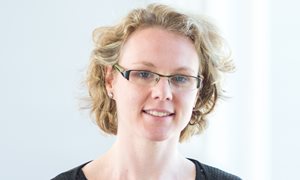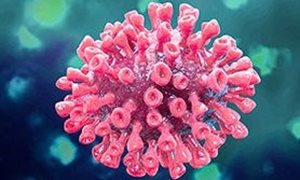 My name is Rebecca Halbach, I was born in Germany, and I work as PhD candidate in the Department of Medical Microbiology in the theme of Infectious diseases and global health. My work focuses on gene regulatory mechanisms by PIWI-interacting RNAs (piRNAs) in early mosquito development.
My name is Rebecca Halbach, I was born in Germany, and I work as PhD candidate in the Department of Medical Microbiology in the theme of Infectious diseases and global health. My work focuses on gene regulatory mechanisms by PIWI-interacting RNAs (piRNAs) in early mosquito development.
When you were a kid what did you want to be when you grew up? Can you tell us something about your child years.
It probably sounds boring, but I cannot remember that I have ever wanted to become anything else than a scientist (subject changed every few weeks, though). I was extremely curious as kid and had this amazing encyclopaedia for children, with all the cool facts like how small the smallest frog species is, and how the planets are called, and how fast the fastest train can go. It literally summarized ALL the knowledge of the world (at least of my small world). Yet, it had a last page and with that all knowledge was limited. So my conclusion was that the only way to get more knowledge is to create it myself, meaning to become a researcher. I don’t think that I knew what a researcher really does back then. Not sure if I know now.
What was your previous academic training, where did you study and why that study?
I studied Molecular Biomedicine and Molecular Life Sciences in Bonn and Hamburg (Germany), respectively. I was intrigued by all the tiny things that build big and complex organisms. During my Master’s program I was supposed to come to the Netherlands only for a short internship, but then liked it here and never left again.
The RIMLS motto is: ‘Today’s molecules for tomorrow’s medicine’. What does this mean for you?
My research focuses on an important class of regulatory molecules (small RNAs), but does not have a direct clinical application. To come up with new ideas for drugs or treatments, we need a thorough understanding of the biological system, its interactions with the environment, and even the environment itself. For example, when scientists were working on peculiar repetitive sequences and associated genes in bacteria in the 90’s and 2000’s, now known as the CRISPR/Cas system, they could never have imagined that their work would revolutionize science and medicine. They were guided by their curiosity and their passion. I think we should never undervalue curiosity-driven science, even when implications for tomorrow's medicine are not directly apparent.
Who is your great example as scientists? And please give a motivation why.
I had the honour to talk to Ada Yonath once who received the Nobel prize for the structure of the ribosome in 2009. She encourages women (especially women with children) in science and I was truly inspired by her personal history and how much she struggled because of her gender. She never gave up and her endurance was awarded with the most honourable prize in science. Yet, she says the what really made her happy was receiving the results themselves, and the “best grandmother of the year” award that she got from her granddaughter.
Which research discovery that you have made has made you most proud?
I am not sure if there is one particular experiment. I can dance through the lab for every result I obtain, because it is one more piece in the puzzle that is called live, and brings me further to my goal of understanding the big picture.
Given unlimited finance what experiment would you perform?
I would sequence the hell out of everything. My world can be divided into two groups: things that can be sequenced, and things that don’t exist.
What does your working area (desk, office) look like and what does it say about you (or your research)?
I have Einstein’s quote hanging above my desk: “If a cluttered desk is a sign of a cluttered mind, of what then, is an empty desk a sign?” to justify how it looks like. Entropy applies to offices as well. More explanation needed?
Nominate a colleague to be in the spotlight and what would you like to ask him or her?
Gijs Overheul: How does it work?
What type of person are you, quick insights:
a) Mac or PC? : PC, as long as it does not run on Windows.b) Theater or cinema? : Can I chose to go exercising instead?
c) Dine out or dine in? : If my roommate cooks, dining in is also fine.
d) Ferrari or Fiat? : My bike and unicycles. Burn fat not oil.
e) Shopaholic or chocoholic? : Chocolate in large quantities please.
f) Culture or Nature : Nature
Related news items

Rebecca Halbach receives idea generator grant to fight mosquito transmitted viruses
8 July 2020Rebecca Halbach and Pascal Miesen have investigated in a collaborative project whether the treatment of mosquitoes with antiviral drugs can prevent the transmission of mosquito-transmitted viral diseases.
go to page
Invasive fungal infections in influenza and COVID-19
8 July 2020 The Aspergillus fungus is found in the lungs of many COVID patients. A parallel occurs with influenza patients, who often develop a serious fungal infection. Although such a serious fungal infection seems to occur less frequently in COVID-patients, alertness remains necessary, go to page
First clinical trial with genetically modified malaria vaccine completed
22 May 2020 In an innovative study, Radboudumc and LUMC jointly tested a candidate vaccine based on a genetically weakened malaria parasite. The results of this clinical trial, published in Science Translational Medicine, show that the vaccine is safe and elicits a defense response against a malaria infection. go to page
New step in the development of a vaccine against malaria
22 May 2020 A new vaccine based on rodent malaria parasites achieved a 95% reduction in infection of the liver in humans. An international consortium publishes the results in Science Translational Medicine. go to page
Stuttering DNA orchestrates the start of the mosquito’s life
9 April 2020 A certain type of junk DNA that is found in mosquitoes and which repeats itself dozens of times, known as ‘satellite DNA’, has now been shown to play an essential role in the early development of mosquito embryos. Ronald van Rij and colleagues published their findings in Nature. go to page
NWO Open Competition Domain Science - XS grant for Ronald van Rij and Jenny van der Wijst
21 January 2020NWO Domain Science has awarded Ronald van Rij, theme Infectious diseases and global health and Jennny van der Wijst, theme Renal disorders an XS grant. The XS category emphatically strives to encourage curiosity-driven and bold research involving a relatively quick analysis of a promising idea.
go to page